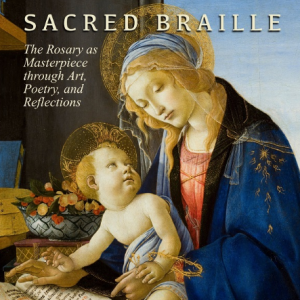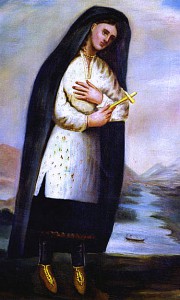Not As Man Sees : She Who Bumps Into Things
The Feast of Kateri Tekakwitha
Today is the Feast of Kateri Tekakwitha, a true American saint. Tekakwitha was a Native American, daughter of a Mohawk chief, a tribe belonging to the Iroquois Confederacy. As a child, she lost both of her parents to smallpox, the same illness that left her with facial scarring and damaged eyesight. “Tekakwitha” translates “she who bumps into things,” and though this phrase could be used to describe any clumsy soul, this name is a reminder of her compromised vision that made it more difficult for her to make her way in the world.
Tekakwitha converted to Catholicism at the age of nineteen and “Kateri” is derived from the French for Catherine, since she took St. Catherine of Siena’s name upon her conversion. This endearing saint, who liked to place small wooden crosses in the woods and renounced marriage, living the charitable and chaste life of a nun, died with these last words: “Jesus, Mary, I love you.”
People who had gathered at her death said that within a half hour of her death, there was a stunning transformation to her face: her smallpox scars disappeared and her visage radiated beauty. In 1 Samuel, it is written: “But the Lord said to Samuel, ‘Do not look on his appearance or on the height of his stature, because I have rejected him. For the Lord sees not as man sees: man looks on the outward appearance, but the Lord looks on the heart.’” (1 Samuel 16:7)
The girl whose face was scarred, whose eyes were dimmed, saw what really mattered: through the light of faith. Those who loved her learned her true beauty.
The great poet John Milton famously lost his eyesight, and bemoaned the difficulty of being a blind writer. In today’s featured poem, Milton observes, “God doth not need/Either man’s work or his own gifts. Who best/ Bear his mild yoke, they serve him best.”
Certainly, Kateri Tekakwitha bore God’s mild yoke and served him. She treated her maladies not as deterrents from faith, but merely as a burden to patiently bear. As Native American singer Robbie Robertson asks, “Didn’t we bear the cross?”, the refrain answers: “Breathe in the sweet fire of love (I’m not afraid anymore)”. Kateri Tekakwitha found that “sweet fire,” and it transfigured her fear and pain into love.

